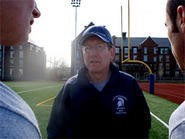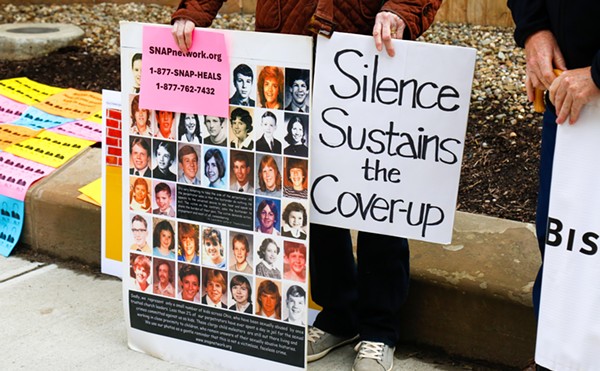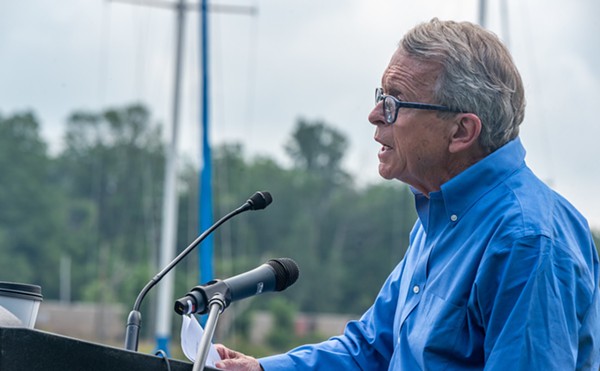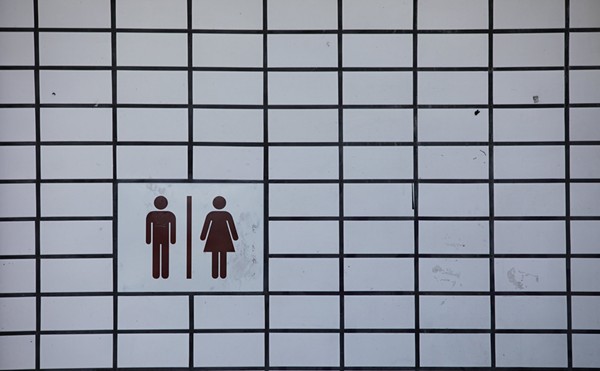The staff had just found out that track coach Dennis Harris, a 24-year veteran, was being fired. It went down as well as an overcooked steak.
Harris wasn't merely a track coach, you see. He was the guy security called to talk a suicidal student off the roof two years ago. The guy who talked on the phone every day with an athlete whose sister had just been diagnosed with cancer. The guy who'd helped more than 40 track members reach their personal bests this season.
The guy you crashed secret meetings to support.
"This is a Division III school. You can't treat coaches like they're Division I," said assistant track coach Cy Levkanich, addressing the room. "These students aren't paid to compete. They don't get their books or their education paid for. These kids are here because they want to be, because they feel comfortable. What you're doing is taking away part of their family."
If Harris was let go, the rest of the track staff would walk too.
Levkanich looked around the room for the man responsible for Harris' firing. But as usual, Athletic Director Dave Diles was nowhere to be found.
Diles' arrival at Case in 2005 was greeted with cautious optimism. He was the former athletic director at Eastern Michigan, with years of Division I experience. He spoke of respecting the values of an academic powerhouse like Case, where studying is eminently more important than sport.
But staffers weren't exactly sold. A drop from Division I to III is akin to Larry Hughes willingly joining the NBA Development League. And Diles' tenure at Eastern Michigan isn't chronicled by love letters.
He was an unpopular figure on campus. One of his first moves was firing veteran basketball coach Milton Barnes and replacing him with rookie Jim Boone, who went on to have one of the worst records in school history. Players walked off in protest. "People involved in athletics weren't thrilled with the guy," says Adam Sparkes, former editor of the school newspaper, the Eastern Echo.
Then the Echo found that the athletic department had been knowingly inflating football attendance. To maintain Division I status, the school needed to average crowds of at least 15,000 per game. So the athletic department deployed baseball players to work the turnstiles, where they counted some people three or four times, an internal investigation revealed. The blame was placed on Diles.
Diles "left because he had to leave," says Ann Arbor News columnist Jim Carty.
In 2005, however, many of Case's coaches weren't aware of Diles' past. They were waiting to learn what he had planned for the department.
But the explanations never came. Diles seldom attended games or practices. He didn't hold individual meetings with coaches to talk over their goals.
"I've had to deal with a lot of athletic directors as a former head coach for 19 years," says Levkanich. "The good ones get to know the staff to get a feel for how the system runs, how the kids respond to the coaching staff. There was none of that."
Students and other staff members noticed Diles' absence too.
Says track and football player Ryan Breon: "He introduced himself at our first football game, but then I never saw him around the facilities. It was kind of weird, because in high school, the athletic director was at every event, but here I really didn't see [Diles] that often."
Despite his invisibility, Diles wasn't a hands-off leader. Among his first acts was calling trainer Barb Moore into his office. He demanded to know why she was keeping two stars from the basketball and football teams on the injured list.
"Because they're not healed," she answered.
"You're being too conservative," he told her. Moore claims that Diles kept putting pressure on her to reactivate the players, indirectly threatening her job if she refused. So she filed a grievance. After the complaint, Diles took away most of her supervisory duties. Two months ago, she quit.
"I worked at Case for 12 years, but I couldn't work another day with the man," says Moore, who's now head trainer at Lake Erie College.
Diles then turned his attention to Harris, a Cleveland native who'd played receiver for Ohio State in the '70s. He'd started out as an assistant football coach at Case, working his way up to head track coach. Though Harris' teams didn't have the best records, he seemed to do well with what he had, pushing most track members to personal bests each year. The team had also grown in popularity, from a squad of just a few dozen to more than 70.
Students say Harris understood what it meant to be an athlete at an academically challenging school. "He's down-to-earth and flexible," says junior Jeremy Gillespie, who says he wouldn't have been able to compete if it weren't for Harris. "I had to study for my MCATs this year, and he didn't push me to come to every practice." If Gillespie came late or had class, Harris would stay late to conduct a solo practice.
But Diles didn't seem to appreciate -- or recognize -- the connection Harris had with students.
"I could immediately tell that Diles didn't like Coach Harris," says sophomore Lauren Dudley, who works part-time in the athletic department. "He treated Coach Harris with no respect."
There were little things -- like passing in the hall without saying "hi" or asking other coaches out to lunch while ignoring Harris.
Then the insults got bigger. When Harris gave Diles his list of assistants last fall, the director scratched out one name and wrote in another name. "This is pretty much the biggest slap in the face you can give a head coach," explains assistant Gregg Langjahr. "It's demeaning."
The slaps kept coming. When one track member qualified for the NCAA finals, Diles selected an assistant coach to accompany her instead of Harris.
Then, last summer, Diles sent Harris a letter telling him that the 2006-'07 season would be his last. According to sources close to the coach, Harris wasn't given a reason for his firing. He was also told he couldn't speak publicly about the matter.
Harris reacted by doing what few jettisoned employees would do: He abided by the directive. "The thing about Coach Dennis is that he believes in 100 percent loyalty to his employer," says Levkanich. "And if he told his athletes he was leaving, it would make a very uncomfortable season for the kids. That was the last thing Harris would want." But somehow, last week, other coaches found out -- and they leaked it.
Students wrote protest letters. They contacted the media. They cried. "It's outrageous," says senior Paul Hannen. "They've given no reason for this at all."
The university refuses to comment. "He's on a contract through the end of this year. Beyond that, I can't really comment, because it's a personnel matter," says Glenn Nicholls, vice president for student affairs. Diles also refused comment.
On a recent afternoon, the track team assembles for one if its last practices. They stand like muscular storks, stretching one leg, then the other, as Harris approaches. A Scene reporter tries to steal him away, but he refuses to talk.
Instead, he turns to his team, speaking as if it were simply another day at practice, with many more to come. "Let's go, let's go," he yells, clapping his hands. "Time's a-wasting."












